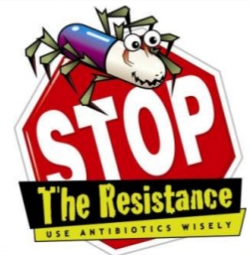They are some important steps should be taken by every human to prevent and stop antibiotic resistance.
Doctors, nurses, veterinarians and other health workers
Don’t prescribe or dispense antibiotics unless they are truly necessary and you have made all efforts to test and confirm which antibiotic your human patient or the animal you are treating should have. Today, it is estimated that in half of all cases, antibiotics are prescribed for conditions caused by viruses, where they do no good. You can also do more to prevent infections in the first place by ensuring your hands, instruments and environment are clean, and employing vaccines where appropriate.
People using healthcare
* Talk with your healthcare provider about antibiotic resistance:
- Ask whether an antibiotic is likely to be beneficial for your illness
- Ask what else you can do to feel better sooner
* Do not take an antibiotic for a viral infection like a cold or the flu.
* Do not save some of your antibiotic for the next time you get sick. Discard any leftover medication once you have completed your prescribed course of treatment.
* Take antibiotics only when prescribed by a certified health professional, but also don’t be timid about asking if you feel you really need them. If you take an antibiotic, always complete the full prescription, even if you feel better, because stopping treatment early promotes the growth of drug-resistant bacteria.
* Do not take antibiotics prescribed for someone else. The antibiotic may not be appropriate for your illness. Taking the wrong medicine may delay correct treatment and allow bacteria to multiply.
* If your healthcare provider determines that you do not have a bacterial infection, ask about ways to help relieve your symptoms. Do not pressure your provider to prescribe an antibiotic.
Farmers and others in the agriculture sector
Ensure that antibiotics given to animals are used only to control or treat infectious diseases and under veterinary supervision. Misuse of antibiotics in livestock, aquaculture and crops is a key factor contributing to antibiotic resistance and its spread into the environment, food chain and humans. Clean and uncrowded conditions and vaccination of animals can reduce the need to use antibiotics.
Governments
We need robust national action plans to tackle antibiotic resistance. Critical steps are improved surveillance of antibiotic-resistant infections, regulation of the appropriate use of quality medicines, and education about the dangers of overuse.
Development organisations
Compared with populations in industrialised nations, people in low-income countries are not getting fair access to antibiotics. Countries seeking donor help to strengthen their health systems need guidance to ensure essential antibiotics are affordable, reach the people who really need them, and are used responsibly.
Industry
Industry needs to move faster and more aggressively to research and develop new antibiotics, but we also have to implement new ways of stimulating research and development. Many talk of an antibiotic “discovery void” since the late 1980s. We are currently in a race between drug development and bacterial evolution. Incentives for developing new antibiotics can help. There are some encouraging trends.














